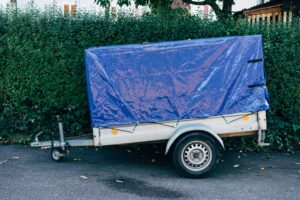What do you need to consider when driving with a trailer? Whether it's a cart, caravan, folding caravan or trailer; before you start driving there are a few things you need to bear in mind. On this page you will find a list of useful tips before going on holiday with a trailer behind your car.
Checklist for the trailer
- Is the load properly distributed and secured?
- Do you have an extra number plate for the trailer?
- Is the trailer tyre pressure correct?
- Is the trailer properly hitched and coupled?
- Is the breakaway cable securely fastened?
- Does the electrical connection between vehicle and trailer work?
- Are the trailer lights working?
- Have you released the handbrake and turned the nose wheel up?
- Have you adjusted your car's rear-view mirrors properly?
- Aren't the car's headlights set too high when fully loaded?
Drive with the right towbar
 If you are travelling with a caravan for the first time and need a new towbar, you can easily buy one online or through a garage and have it installed. Many vehicles are fitted with a towbar as standard, but this is not the case with all cars. A detachable model is also an option and has the advantage that you only attach it as soon as you want to use it. Want more info on a hitch mounting? Then read on this page.
If you are travelling with a caravan for the first time and need a new towbar, you can easily buy one online or through a garage and have it installed. Many vehicles are fitted with a towbar as standard, but this is not the case with all cars. A detachable model is also an option and has the advantage that you only attach it as soon as you want to use it. Want more info on a hitch mounting? Then read on this page.
Driving with a trailer: change in driving behaviour
When driving with a trailer for the first time, you will notice a change in driving behaviour. The car is, of course, overall longer, which means that parking has to be done differently. When turning, the car will swerve and also when reversing, you have to practise driving correctly. When it is windy, tall caravans and trailers can catch wind more easily and start to sway. At such times, the motto is to drive carefully and more slowly. The ANWB offers further tips for driving in windy and stormy weather.
Secure the load
It is important to distribute the load on the trailer evenly and secure the load properly with lashing straps and nets to avoid danger to fellow road users (and yourself, of course!). There is no legal obligation to cover all loose cargo. However, you should prevent loose cargo from causing danger or hindrance by the cargo falling off or blowing off. On the government website in article 5.18.6 section 2 of the Vehicles Regulation state the requirements on how to cover cargo:
"Loose load which by its nature cannot be secured to or on the vehicle shall be properly covered if danger or nuisance arises or is likely to arise due to falling or blowing load."
How fast can you drive with a trailer?
And one of the most popular questions: how fast can you go with a trailer? The maximum speed with a trailer depends on the weight of the trailer. Under 3500 kilos, you are allowed to drive 90 kilometres per hour on motorways. When the weight exceeds 3500 kilos, the maximum speed is 80 kilometres per hour.
If you want to drive abroad with a trailer, always enquire in the country concerned about the maximum permitted speed. So if you are going on holiday with a trailer or caravan, it is important to be aware of this and to look it up and check it in advance for each country. Below is a list per country.
| Country | Maximum permitted mass | Permitted speed |
|---|---|---|
| Belgium | <3500 kg | 120 km/h |
| >3500 kg | 90 km/h | |
| Germany | - | 80 km/h |
| TUV approved + pace 100 | 100 km/h | |
| France | <3500 kg | 130 km/h |
| <3500 kg and rain | 110 km/h | |
| >3500 kg | 90 km/h | |
| Luxembourg | - | 90 km/h |
| Netherlands | <3500 kg | 90 km/h |
| >3500 kg | 80 km/h | |
| Austria | <750 kg | 100 km/h |
| >750kg and total weight >3500kg | 60 km/h | |
| trailer is heavier than car | 70 km/h | |
| Portugal | - | 100 km/h |
| Spain | <750 kg | 90 km/h |
| >750 kg | 80 km/h | |
| Switzerland | - | 80 km/h |
Oh yes, what driving licence do you need?
 To pull a trailer, you need driving licence B, BE or B+. Which driving licence you need for your trailer, caravan or semi-trailer depends on the permitted maximum mass. This is the empty weight plus the maximum load. For example, a trailer may have a maximum permitted mass of 750 kilos. If the trailer itself weighs 150 kilos (empty weight), you may still add 600 kilos of cargo (load capacity). It is therefore not about the actual weight. Check the website of the central government for the official guidelines.
To pull a trailer, you need driving licence B, BE or B+. Which driving licence you need for your trailer, caravan or semi-trailer depends on the permitted maximum mass. This is the empty weight plus the maximum load. For example, a trailer may have a maximum permitted mass of 750 kilos. If the trailer itself weighs 150 kilos (empty weight), you may still add 600 kilos of cargo (load capacity). It is therefore not about the actual weight. Check the website of the central government for the official guidelines.
If you follow these tips, you will drive safely on holiday with the trailer behind the car. Enjoy your trip!
